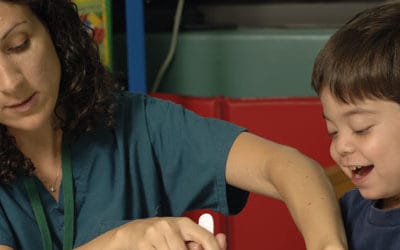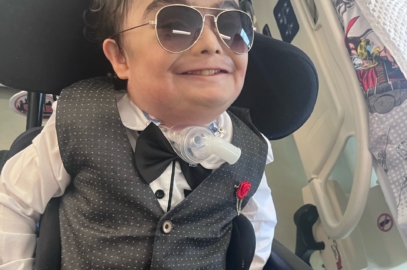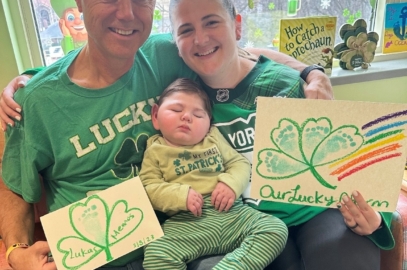With a plastic fork in one hand and a plastic knife in the other, Max cuts his French toast, takes a bite, and gets ready to do it again. Performing this daily morning ritual might seem the norm for most five-year-olds, but for Max and his family, this is a major accomplishment. You see, for most of Max’s young life prior to coming to St. Mary’s, he relied on a feeding tube for nourishment.
Born prematurely at just 29 weeks, Max weighed less than three pounds. He spent the first three months of life in a neonatal intensive care unit where he was also treated for a life-threatening heart condition. Placed on a ventilator not once, but twice in his first year, Max’s tiny lungs sustained damage. There was concern he might permanently remain on a ventilator. Life for Max and his family was a virtual rollercoaster ride – never knowing what was around the next corner. Max’s parents watched other families growing up around them while Max remained in the hospital. Doctors were eventually able to stabilize his heart and lung condition, but new complications set in after he came home. Little Max lacked the ability to eat – a condition all too often common in preemies – and required a feeding tube to receive nutrition.
As Max grew up, his condition manifested into a serious eating disorder. For the first two and a half years of his life, the majority of his calories were administered through a feeding tube. The little food he could tolerate – yogurt, cheese puffs, and formula from a bottle – were rarely, if ever, kept down. Max’s parents aggressively searched for help for their young son. He had beaten the odds before and they were determined to do it again.
He was admitted to St. Mary’s Center for Pediatric Feeding Disorders, the first and only program of its kind in New York. Max was evaluated by an interdisciplinary team, including a gastrointestinal physician, nutritionist, psychologist, nurse practitioner, and a speech language pathologist. A plan was formulated and an intensive course of action was put in place. According to his mother, Max made more progress in his nine weeks in the Feeding Program than he had in his entire life. And because St. Mary’s included her as part of the team, she was an active participant in his care and recovery.
Today Max is an outgoing, charismatic, and resilient child who is growing by leaps and bounds. Now a preschooler in St. Mary’s Institute for Child Development, Max continues to be monitored by the Feeding Program to make sure he stays on track.
While life may still not be “normal” at Max’s house, he’s come a long way from the days of ventilators, oxygen tanks, and extended hospital stays. As Max’s dad explains, “NICUs get the glory of saving lives, but places like St. Mary’s help put lives back together.” His parents are grateful for his progress and appreciate the little things in life. Little things like eating French toast for breakfast.






